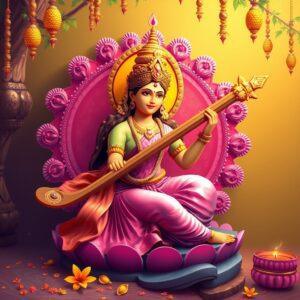Hindu philosophy, a profound and ancient tradition, offers valuable insights into existence, consciousness, and the universe. This beginner’s guide explores key concepts and schools of thought within Hindu philosophy, providing a foundational understanding for those seeking wisdom and the convenience of online resources for authentic ritual items.
Overview of Hindu Philosophy
Hindu philosophy encompasses a diverse range of teachings and thoughts. Key aspects include:
- The Vedas: Ancient sacred texts serving as the bedrock of Hindu philosophy.
- The Upanishads: Philosophical scriptures delving into the nature of reality and the self. These texts explore the concept of Brahman, the ultimate reality, and its relationship to the individual self, Atman.
- The Bhagavad Gita: A crucial text addressing life’s moral and philosophical dilemmas, particularly relevant in the context of Dharma and Karma. It offers guidance on how to live a righteous life and fulfill one’s duties.
- The Smritis: Texts focusing on laws, ethics, and social responsibilities. These texts provide practical guidelines for navigating social and ethical dilemmas, emphasizing the importance of Dharma in daily life.
- Dharma: The moral law governing individual conduct and societal harmony. It emphasizes the importance of fulfilling one’s duties and responsibilities in life.
- Karma: The principle of cause and effect in moral actions, influencing the cycle of rebirth. It highlights the significance of our actions and their consequences, shaping our present and future lives.
- Moksha: Liberation from the cycle of birth and death, a central goal of spiritual practice. This liberation signifies the ultimate freedom from suffering and the realization of one’s true nature.
Looking for authentic puja items to enhance your spiritual practice? Explore our wide collection of Bel malas and Tulsi malas at poojn.in.
The Six Schools of Hindu Philosophy
Hindu philosophy is traditionally categorized into six astika (orthodox) schools:
- Nyaya: Focuses on logic, epistemology, and methods of acquiring knowledge. This school emphasizes the importance of reasoning and critical thinking in understanding reality.
- Vaisheshika: Emphasizes metaphysics and the categorization of reality. It explores the fundamental constituents of the universe and their interactions.
- Samkhya: Presents a dualistic view of consciousness (Purusha) and matter (Prakriti). This duality forms the basis for understanding the nature of existence and liberation.
- Yoga: Explores the path to spiritual liberation through physical and mental discipline. It emphasizes practices like meditation, asanas, and pranayama to achieve self-realization.
- Mimamsa: Concentrates on the interpretation of the Vedas and ritual practice. This school emphasizes the importance of rituals and sacrifices in achieving spiritual goals.
- Vedanta: Centers on the teachings of the Upanishads and the nature of Brahman. It explores the concept of non-duality and the realization of the self’s identity with Brahman.
Poojn.in offers a wide selection of Shiva Lingams and Adiyogi statues, perfect for your home altar and personal spiritual practice.
Key Concepts in Hindu Philosophy
Understanding Hindu philosophy involves grasping several core concepts:
- Brahman: The ultimate, unchanging reality, the source of all existence.
- Atman: The individual soul or self, considered eternal and part of Brahman. Understanding the relationship between Atman and Brahman is central to achieving Moksha.
- Maya: The illusion or appearance of the phenomenal world, obscuring the true nature of reality.
- Samsara: The cycle of birth, death, and rebirth, driven by Karma.
- Karma: The law of moral causation, where actions have consequences that shape future lives.
- Dharma: The ethical and moral principles that guide conduct and maintain social order.
- Moksha: Liberation from the cycle of Samsara, achieved through self-realization and the understanding of Brahman.
Practical Applications of Hindu Philosophy
Hindu philosophy offers practical guidance for daily life:
- Ethical Living: Following Dharma, the moral law, in all aspects of life. This involves fulfilling one’s duties and responsibilities towards oneself, family, and society.
- Meditation and Yoga: Cultivating mental discipline and spiritual growth through these practices. Yoga and meditation help to calm the mind, enhance self-awareness, and promote inner peace.
- Rituals and Worship: Connecting with the divine through rituals and ceremonies. These practices help to cultivate devotion, purify the mind, and strengthen one’s spiritual connection.
- Community and Social Responsibility: Contributing to the well-being of society and fulfilling social obligations. This includes acts of service, charity, and promoting harmony within the community.
- Self-Reflection: Examining one’s thoughts, actions, and motivations to align with Dharma. Self-reflection promotes self-awareness, personal growth, and ethical decision-making.
- Pursuit of Knowledge: Seeking wisdom and understanding through study and contemplation. This involves learning from sacred texts, teachers, and experiences.
- Detachment: Letting go of attachments to material possessions and desires. Detachment cultivates inner peace, reduces suffering, and facilitates spiritual progress.
Enhance your understanding of Hindu deities with our collection of Laddu Gopal idols at poojn.in.
Influence of Hindu Philosophy on Indian Culture
Hindu philosophy has deeply influenced Indian culture, permeating various aspects of life:
- Art and Architecture: Temples, sculptures, and paintings often depict philosophical themes and deities.
- Literature and Epics: The Ramayana and Mahabharata embody teachings of Dharma and Karma, providing moral guidance.
- Music and Dance: Classical forms like Bharatanatyam reflect spiritual concepts and stories.
- Festivals: Diwali, Holi, and other festivals symbolize philosophical ideas and celebrate the triumph of good over evil.
- Social Norms: The social structure and traditions in India are deeply rooted in Hindu philosophical principles.
- Language: Sanskrit and regional languages preserve ancient philosophical discourses and teachings.
- Education: Traditional Gurukuls and modern institutions continue to teach and propagate Hindu philosophy.
Discover a wide range of sandalwood incense sticks and rose incense sticks at poojn.in to create a serene atmosphere for your spiritual practices.
Conclusion
Hindu philosophy provides a rich and comprehensive guide to living a meaningful life. It emphasizes ethical conduct, spiritual practices, and the pursuit of knowledge. By understanding and applying these principles, we can cultivate inner peace, contribute to society, and progress towards spiritual liberation. Poojn.in supports your journey by providing access to authentic ritual items and resources that enhance your understanding and practice of Hindu traditions.


